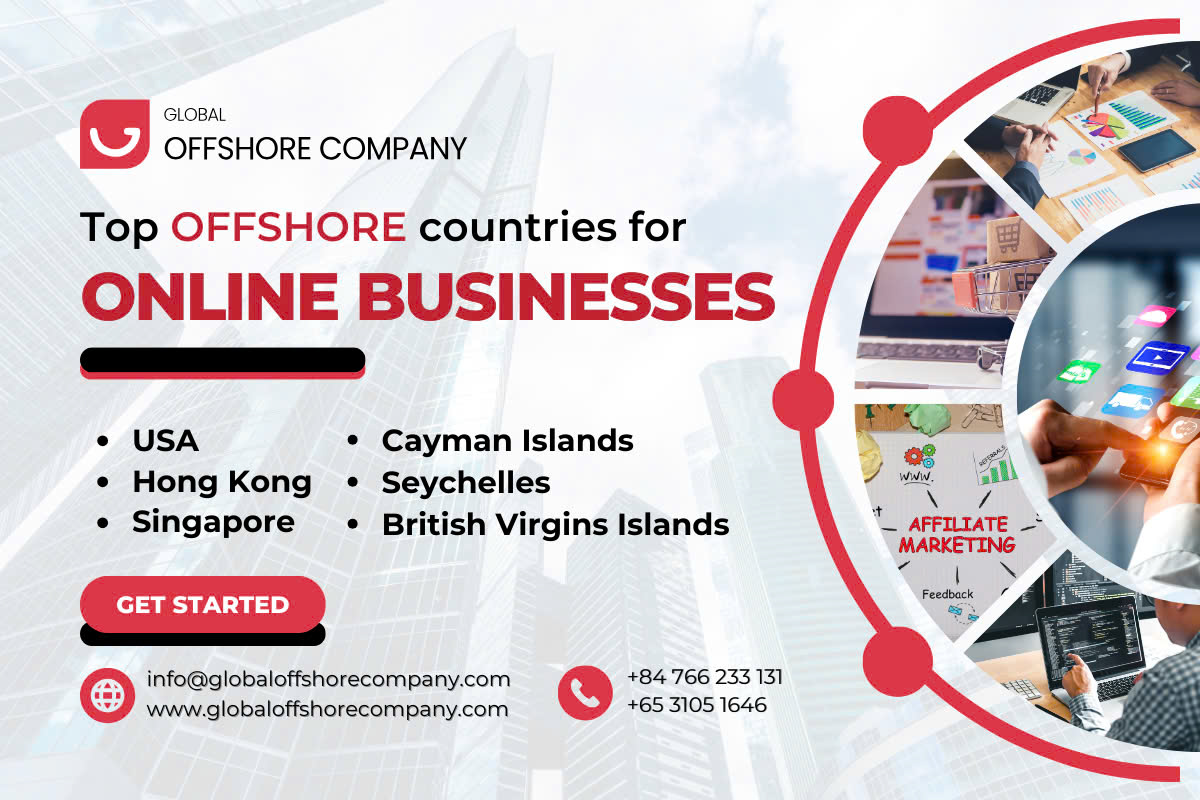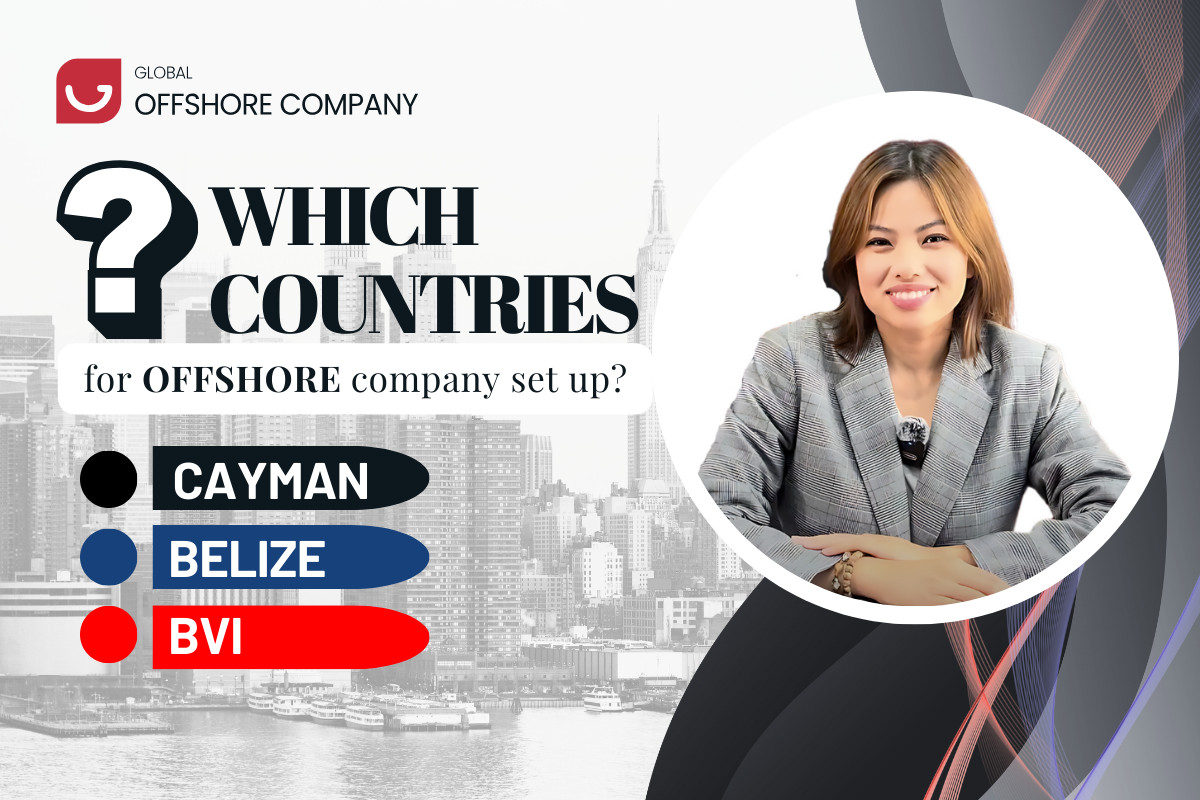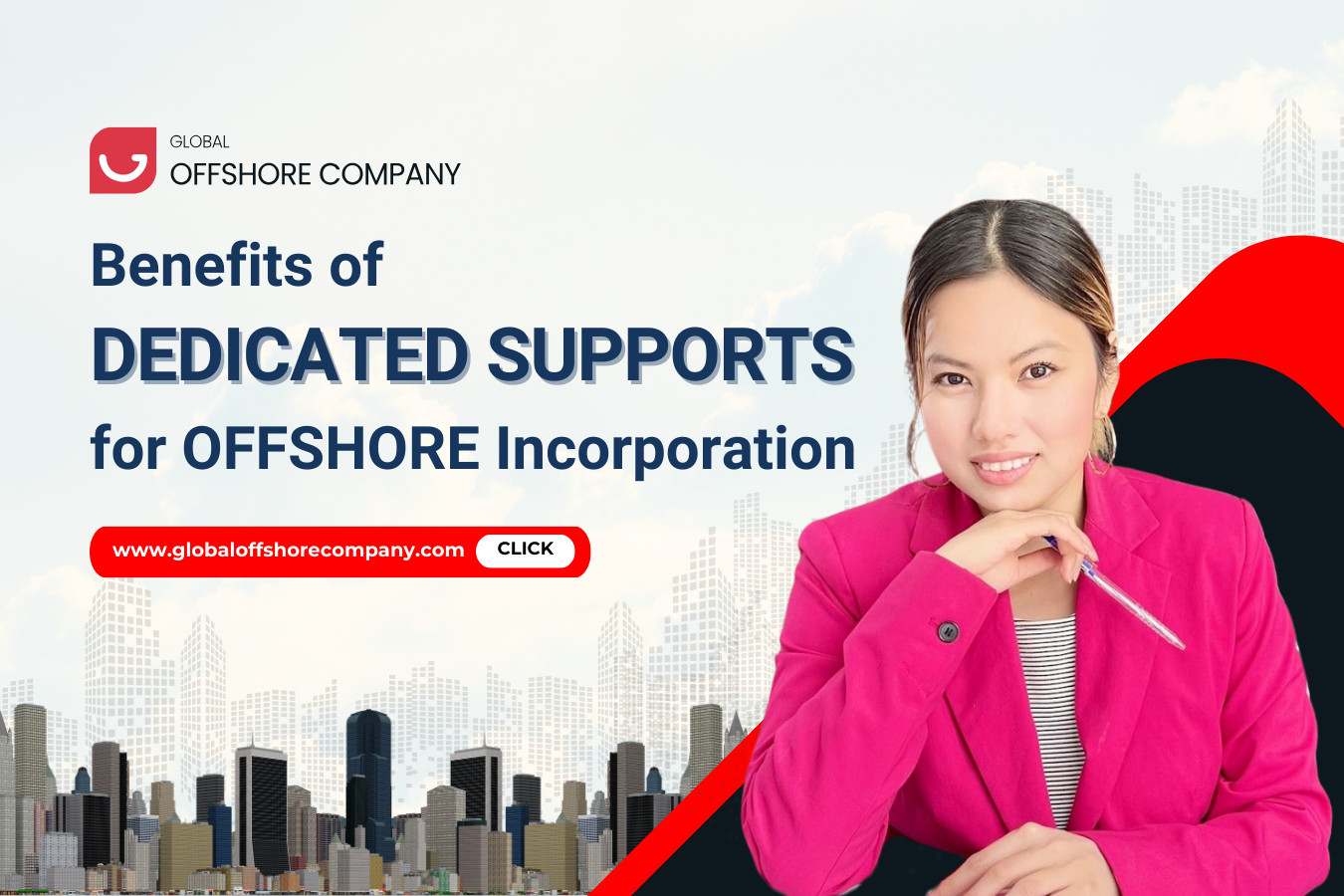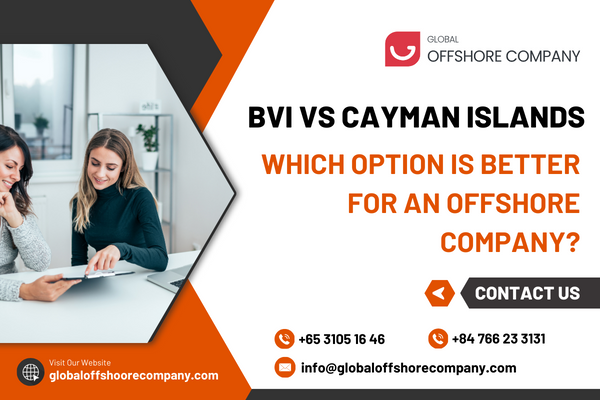Best offshore company registration: Cayman Islands, BVI or Belize?
When it comes to incorporating an offshore company, entrepreneurs and businesses have several appealing options to consider. Three of the most popular offshore jurisdictions are the Cayman Islands, the British Virgin Islands (BVI), and Belize. What are the differences and similarities between these offshore countries? Furthermore, which kind of business will work best with each nation's regulations? Let's find out with G.O.C through this article to enhance your understanding of these famous jurisdictions.
1. Belize
Setting up an offshore company in Belize is a step to open many opportunities to participate in global business activities.
Pros:
- Favorable tax: Belize company has favorable tax regime, a Belize international business company and Belize LLC which carries on business in Belize will be subject to business tax on revenue at a rate ranging from 1.75% - 6% depending on business activities.
- Confidentiality: Provide a safe and secure business environment to business investors. Belize company benefits from strict confidentiality, with no public records on the register of business owners. Only the company’s name can be searched via the government website, other information will be kept entirely confidential which is also a huge advantage that attracts many foreign investors.
- Flexible, easy to incorporate and cost-effective: The company formation here is fast, remote and simple. There’s no local member required, the entity is 100% foreign-owned. No minimum share capital requirements, Belize offshore company is also in the top cost-effective jurisdiction for both incorporation and annual renewal.
- Stable political environment: the stability of politics in Belize is highly valued. Belize business company has always preferred a peaceful and secure location to do business. In other jurisdictions making plans gets difficult when politics and governments are always changing and updating new policies. Belize has been committed to providing stability and considering the needs of its people and foreign investors who set up offshore companies to boost their business. The country has a democratic system of government, with clear laws and a well-regulated financial industry.
Cons:
- Increasing compliance requirements: Belize has taken steps in recent years to strengthen its regulatory framework and compliance requirements for Belize offshore business. Offshore company in Belize now faces more thorough due diligence and reporting requirements. Moreover, Belize has strengthened its enforcement capabilities and is imposing stricter penalties for non-compliance related to offshore business. Offshore company in Belize must file annual tax returns, submit financial statements, and file Economic Substance forms every year. Consequently, this can be a drawback for business owners concerned about the burden of paperwork.
- Less banking options: Belize is not internationally recognized as in leading offshore jurisdictions like the Cayman Islands, so there are fewer options for offshore banking in Belize. The banks usually prefer countries with good reputations and developed, stable economies such as offshore company in Cayman and offshore company in BVI.
- Limit business operation: Belize international business company and LLCs are restricted from doing business with residents of Belize or owning real estate in Belize, which limits certain business operations. This significantly limits the domestic market opportunities for these offshore companies.
2. The British Virgin Islands
The British Virgin Islands (BVI), another leading offshore country, is particularly valued for its flexible corporate laws and strong confidentiality protections.
Pros:
- "Tax haven" country: BVI offshore company is not taxed on income tax, no taxes on dividends, interest, royalties, compensation, as well as any capital gains, real estate, inheritance tax, or gift taxes on any shares, debt obligations, and other payments made by the business or other assets of a BC (BVI Business Company). As long as the BVI offshore business owners don't conduct any business activities inside the BVI or any property ownership transactions in the BVI, BVI offshore company is free from any type of taxes.
- High confidentiality: BVI places a strong emphasis on safeguarding the privacy of its corporate entities. As a result, the information of the BVI company's owners would remain confidential. The director, shareholders, and UBO's personal information won't be shown to the public unless in specific circumstances, including court orders. Because of its high level of information security, establishing an offshore business in the British Virgin Islands proves suitable for those who wish to maintain the privacy of their personal information.
- Flexible company structure and easy to incorporate:
- BVI offshore company does not require a local director to represent foreign business owners, which means 100% foreign-owned company is accepted
- No limitation of shareholders and no minimum share capital required
- The director and shareholder can be a person or a corporation
- BVI offshore incorporation is simple, fast, and can be completed remotely, you can form a company there without having to travel to BVI.
- Many banking options: Due to the transparency and a robust legal system offshore companies in the British Virgin Islands can take advantage of many offshore banking options. With a BVI bank account, investors can access a diverse range of investment opportunities across global markets. In addition, all BVI offshore banks must undergo an obligatory annual audit to ensure their compliance with BVI laws. Moreover, customers who want to open a business bank account in BVI don’t need to travel there to proceed with the bank opening process. With a company bank account, it is easy to manage your finances through online banking services.
Cons:
- Constant rule changes: The government regulations here are considered beneficial to tax evasion and money laundering activities. As a result, to avoid being associated with bad reputations and to maintain transparency, the government must constantly update its policies and amend the legislation. The businesses there will need to pay attention to every new amendment to stay updated on the latest laws and changes in BVI international company regulations. But it also demonstrates the commitment of the BVI Company Registry to maintain a high level of international cooperation.
- Annual compliances: The annual compliances of BVI offshore company include Renewal, Annual Return, and Economic Substance. Along with continuous updates on new laws, BVI international company's annual compliance is also one of the important factors to show that BVI always complies with international laws and to demonstrate the transparency of the business system as well as attract investment from abroad. However, this may cause some trouble for business owners who prefer simple compliance and straightforward procedures for their companies. Failure to comply with the economic substance rules can result in penalties and potentially the company being struck off the BVI register. Meeting these requirements can be challenging and expensive, especially for smaller or more passive offshore entities.
3. The Cayman Islands
The Cayman Islands, which is situated in the Caribbean has evolved into a global financial hub in incorporating offshore companies. This attracts businesses from around the world to come there to seek to expand business opportunities. Let's take a look at some of the crucial benefits that this country brings to Cayman offshore companies.
Pros:
- Stable political and economic environment: Cayman Islands provides a stable political and economic environment with a well-developed legal system based on English common law. Therefore, this will minimize the risk of sudden changes or disruptions that could negatively impact offshore operations. The political and economic stability of the Cayman Islands helps to build investor confidence in the jurisdiction, both for the Cayman Islands offshore company itself and for any investors or partners involved. Furthermore, this can be particularly beneficial for Cayman offshore businesses engaged in international trade, investment, or banking activities, as they can leverage the Cayman Islands' offshore reputation and connections.
- Tax exemption and simple obligation: Like the other jurisdictions, offshore businesses do not have to pay tax for profit from outside of the Cayman Islands. Besides that, corporate papers relating to business, such as the register of shareholders or meeting minutes, do not need to be registered with Cayman Islands authorities and can be held anywhere in the globe.
- Payment gateway: the Cayman Islands offshore company offer the payment gateway by Paypal, a benefit that the other two jurisdictions do not. Cayman has established itself as a hub for global financial services, which means offshore companies incorporated in Cayman Islands have access to a wide range of world business activities easier through this payment gateway. This can be beneficial for businesses looking to accept payments from customers around the world. The Cayman Islands' reputation is stable and well-regulated, so it will help the company gain trust more easily when dealing with the providers and customers if they want to use the payment gateway.
- Simple compliance check after incorporation: The compliance check for annual maintenance for Cayman islands offshore business is easier than in other countries. You only need to pay for the renewal fee annually and file the economics substance form, no need to do accounting and auditing, and no financial report. Therefore, Cayman offshore company not only have a good reputation but are also easy to conduct and maintain the business with simple compliance obligations every year.
Cons:
- High cost: The main factor that every business owner is concerned about is the cost of Cayman Islands company registration. While it can save time and effort, businesses need to consider the cost implications of not only the incorporation fees but also some other fees such as annual compliance fees, government fees...etc. As an island nation in the Caribbean, the Cayman Islands' remote geographical location can present logistical challenges and increased travel costs for offshore companies with global operations or the need to frequently travel to and from the jurisdiction.
- Renewal: Offshore company in the Cayman Islands is required to renew their registration and pay the applicable fees on December 31st each year no matter when the companies are incorporated. If an offshore company in the Cayman Islands fails to renew its registration for an extended period, it may face the risk of being struck off the corporate registry and ultimately dissolved by the authorities.
4. Conclusion
In summary, Belize is often seen as not having a high reputation for offshore business and offshore incorporation compared to more established, regulated, and stable offshore hubs like the BVI and Cayman Islands. This type of jurisdiction will be suitable with customers who don’t hesitate to deal with complicated paperwork but to gain transparency for their companies. Belize presents a more economical offshore option, with low incorporation fees. However, Belize also has a less developed regulatory environment and may not offer the same level of global financial services infrastructure as the Cayman Islands or BVI.
The BVI is a popular offshore jurisdiction known for its streamlined incorporation process, low taxes, and flexible company structures. It offers a cost-effective option for many offshore companies. However, the BVI may be perceived as less transparent and has faced increased regulatory pressure in recent years, which could be a concern for some customers who prefer simple procedures and paperwork. The flexible corporate laws and confidentiality protections make it attractive for complex multinational structures.
Lastly, the Cayman Islands is widely regarded as a premier offshore financial center, offering a stable political and economic environment, robust regulatory framework, and access to a global payment gateway. Although setting up a Cayman Islands company also has some disadvantages, the developed legal system renders the Cayman Islands a stable jurisdiction that still has much to offer. Therefore, it is cost-worthy for customers to set up and develop their company here due to the good reputation of the Cayman Islands and well-established regulatory framework.
Ultimately, the choice of offshore country will depend on the specific needs and objectives of the business. Factors like tax optimization, cost, confidentiality, regulatory environment, and reputation will all play a role.
Consulting with experienced offshore incorporation specialists in G.O.C is highly recommended to ensure the selected jurisdiction aligns with the company's long-term strategy and risk tolerance. With the right approach, an offshore company can provide substantial benefits across a range of industries and applications. Our experienced experts are always ready to assist you on your incorporation journey.











